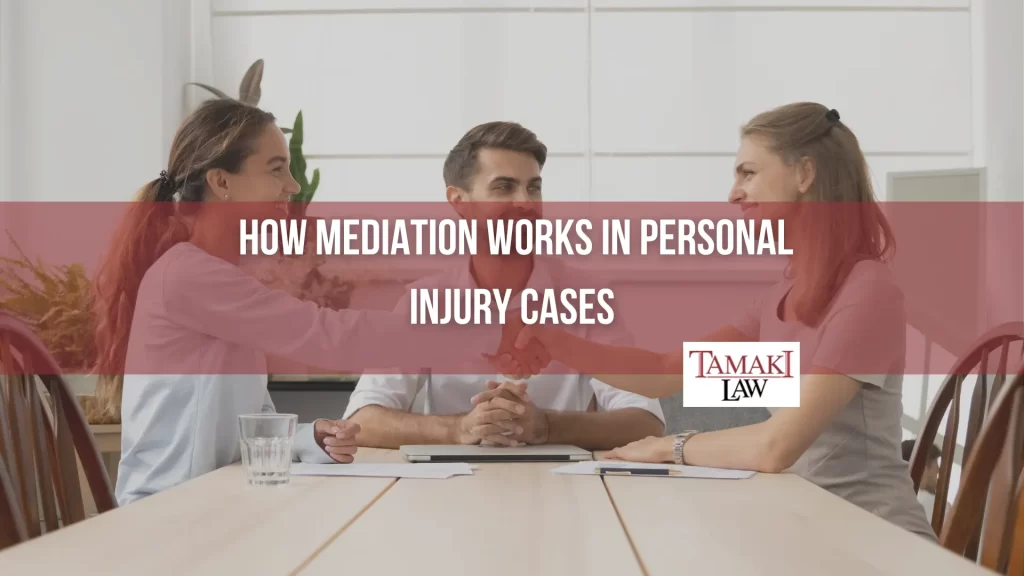
After an accident in which someone injured you, you want the most money possible and a short legal process. Unfortunately, insurance settlement negotiations or a civil trial can take a while, leaving you in dire financial straits for weeks or months. Mediation can shorten this process, but knowing how mediation works in Washington State before taking this approach is crucial.
At Tamaki Law, we believe in using all the legal tools at our disposal to help you. We have significant experience with personal injury claims in Washington State, including many cases settled through mediation. This guide explains the mediation process in Washington’s personal injury claims and the potential benefits it offers. Let’s explore this fascinating topic together.
Why Consider Mediation After an Injury?
Mediation is a powerful tool in the legal world, as it offers disputing parties a path to agreement that avoids lengthy, contentious legal proceedings. Here’s why mediation might be right for you:
- Cost-Effective: Legal battles can drain your wallet. Mediation often costs less than going to court, saving you money in the long run.
- Time-Saving: Court cases can drag on for months or even years. Mediation can resolve disputes faster, getting results sooner.
- Confidentiality: Unlike public court trials, mediation is private. Details stay between you, the other party, and the mediator.
- Control: In court, a judge decides the outcome. Both parties have a say in mediation, giving you more control over the final agreement.
- Flexibility: Mediation sessions are more relaxed. You can schedule them at convenient times, unlike rigid court dates.
- Less Stress: Courtrooms can be intimidating. Mediation offers a less formal setting, reducing anxiety and tension.
- High Success Rate: Many cases settled through mediation reach an agreement. It’s an effective way to find common ground.
When you consider mediation, you’re contemplating a way to seek justice while prioritizing your well-being. Mediation’s advantages might be the best path for your personal injury claim in Washington.
The Role of Your Personal Injury Lawyer in Mediation
 Your lawyer’s job is to guide, protect, and advance your interests at every step of the process. Here’s how your attorney champions your cause during mediation:
Your lawyer’s job is to guide, protect, and advance your interests at every step of the process. Here’s how your attorney champions your cause during mediation:
- Preparation: You shouldn’t go into a mediation session blind. Your attorney can explain the mediation process, discuss potential outcomes, and set realistic expectations for you.
- Advocacy: At the mediation table, your attorney is your voice. They present your case, stress critical points, and work tirelessly to achieve your best outcome.
- Negotiation: Mediation sessions are not just about stating your case. Your lawyer can help negotiate the terms of a potential settlement, pushing for conditions that best serve your interests.
- Advice on Offers: When a settlement offer lands on the table, it’s tempting to say “yes” immediately. But your attorney can help you evaluate it. They’ll consider whether it truly covers your injuries and losses and advise you on your next steps.
- Protection: Mediation is about finding common ground, but that doesn’t mean you should settle for an unfair deal. Your lawyer can help you avoid accepting a deal that’s not in your favor.
- Finalizing Details: If both parties can agree on a settlement, your lawyer can help iron out the specifics. They’ll check to see that the deal is legally sound and beneficial to you.
What to Expect During the Mediation Process
Stepping into mediation might feel like venturing into the unknown. But knowing what lies ahead can ease your worries. Here’s a step-by-step breakdown of the process in Washington personal injury claims:
- Choosing a Mediator: Both parties agree on a neutral third party as a mediator. This person won’t take sides and is there to facilitate helpful discussion.
- Preparation: Before the session, your lawyer will gather all the necessary documents and evidence. They’ll also prepare you for what to expect.
- Opening Statements: The mediation session starts with each side sharing their view of the dispute. It sets the stage for the discussions to follow.
- Joint Discussion: At this stage, both parties (along with their lawyers) come together to discuss the case. It’s a chance for both sides to clarify points and better understand each other.
- Private Sessions: The mediator will meet with each party separately. This is a time to share concerns without the other side present.
- Negotiation: Both parties work toward a settlement. It’s a give-and-take process, and the goal is to reach a fair outcome for everyone.
- Agreement, Impasse, or Another Session: One of three things can happen at this stage. Both sides could reach an agreement. They might realize they can’t find common ground. Or if they are on the way to a settlement and time is running out, they can schedule another session.
- Finalizing Details: If there’s an agreement, all parties will determine the specifics. Your lawyer will see that the agreement is drafted to include all the terms you agreed to.
- Closure: Once all the details are set, the mediation concludes. Without an agreement, your lawyer will discuss the next steps with you.
Key Takeaways for Injured Individuals
There’s a lot to know and remember about mediation. However, if you need the highlights, here are the essential takeaways to keep in mind:
- Control: Unlike court trials, where a judge or jury decides the case, mediation is an opportunity for you to play a direct role in the outcome of your claim.
- Your Lawyer is Your Guide: During mediation, your personal injury attorney is your guide and champion, advocating for you and protecting your best interests.
- Confidential and Cost-Effective: Mediation is private, costs less, and takes less time than a full-blown court trial, and often provides a faster route to resolution.
- Understand the Process: Mediation involves specific steps, and knowing each phase can help you approach the session confidently and easily.
- Outcome Isn’t Guaranteed: Mediation has a high success rate, but reaching an agreement isn’t a given.
Contact Our Washington State Injury Attorneys Now
Remember, mediation is an avenue for reaching a fair and timely resolution of your case. With the insight and the support of a seasoned attorney from Tamaki Law, it could provide the avenue to the justice you deserve. Call (800) 801-9564 now or complete our contact form for a free consultation.
Related posts
What Makes Tamaki Law Different From Other Law Offices?
The Truth About Insurance Companies – You’re NOT in Good Hands
What to Do if You are Involved in a Car Collision
How to Create & File a Personal Injury Complaint in Washington
